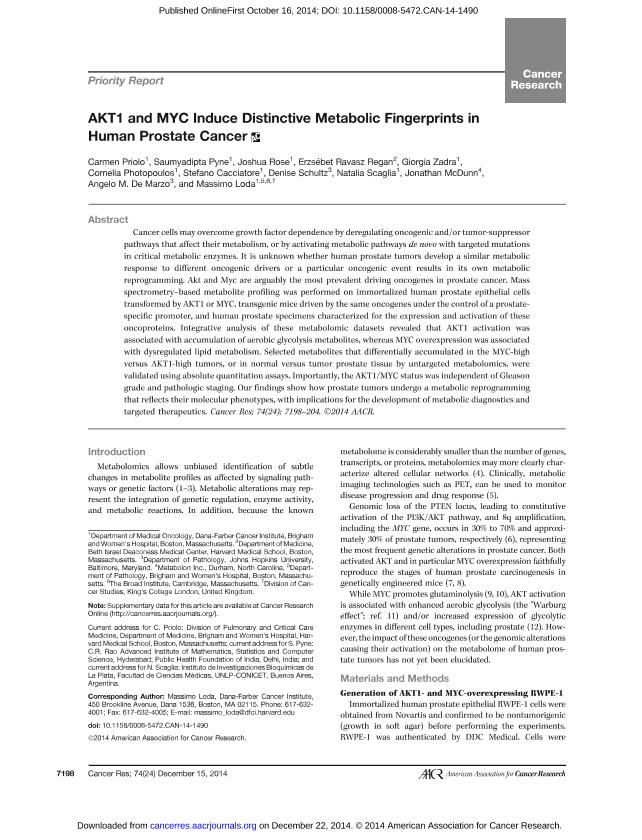Mostrar el registro sencillo del ítem
dc.contributor.author
Priolo, Carmen
dc.contributor.author
Pyne, Saumyadipta
dc.contributor.author
Rose, Joshua
dc.contributor.author
Regan, Erzsébet Ravasz
dc.contributor.author
Zadra, Giorgia
dc.contributor.author
Photopoulos, Cornelia
dc.contributor.author
Cacciatore, Stefano
dc.contributor.author
Schultz, Denise
dc.contributor.author
Scaglia, Natalia

dc.contributor.author
McDunn, Jonathan
dc.contributor.author
de Marzo, Angelo M.
dc.contributor.author
Loda, Massimo
dc.date.available
2020-04-17T18:08:39Z
dc.date.issued
2014-12
dc.identifier.citation
Priolo, Carmen; Pyne, Saumyadipta; Rose, Joshua; Regan, Erzsébet Ravasz; Zadra, Giorgia; et al.; AKT1 and MYC Induce Distinctive Metabolic Fingerprints in Human Prostate Cancer; American Association for Cancer Research; Cancer Research; 74; 24; 12-2014; 7198-7204
dc.identifier.issn
0008-5472
dc.identifier.uri
http://hdl.handle.net/11336/102936
dc.description.abstract
Cancer cells may overcome growth factor dependence by deregulating oncogenic and/or tumor-suppressor pathways that affect their metabolism, or by activating metabolic pathways de novo with targeted mutations in critical metabolic enzymes. It is unknown whether human prostate tumors develop a similar metabolic response to different oncogenic drivers or a particular oncogenic event results in its own metabolic reprogramming. Akt and Myc are arguably the most prevalent driving oncogenes in prostate cancer. Mass spectrometry–based metabolite profiling was performed on immortalized human prostate epithelial cells transformed by AKT1 or MYC, transgenic mice driven by the same oncogenes under the control of a prostate-specific promoter, and human prostate specimens characterized for the expression and activation of these oncoproteins. Integrative analysis of these metabolomic datasets revealed that AKT1 activation was associated with accumulation of aerobic glycolysis metabolites, whereas MYC overexpression was associated with dysregulated lipid metabolism. Selected metabolites that differentially accumulated in the MYC-high versus AKT1-high tumors, or in normal versus tumor prostate tissue by untargeted metabolomics, were validated using absolute quantitation assays. Importantly, the AKT1/MYC status was independent of Gleason grade and pathologic staging. Our findings show how prostate tumors undergo a metabolic reprogramming that reflects their molecular phenotypes, with implications for the development of metabolic diagnostics and targeted therapeutics.
dc.format
application/pdf
dc.language.iso
eng
dc.publisher
American Association for Cancer Research

dc.rights
info:eu-repo/semantics/openAccess
dc.rights.uri
https://creativecommons.org/licenses/by-nc-sa/2.5/ar/
dc.subject
AKT
dc.subject
MYC
dc.subject
METABOLISM
dc.subject
PROSTATE CANCER
dc.subject.classification
Bioquímica y Biología Molecular

dc.subject.classification
Medicina Básica

dc.subject.classification
CIENCIAS MÉDICAS Y DE LA SALUD

dc.title
AKT1 and MYC Induce Distinctive Metabolic Fingerprints in Human Prostate Cancer
dc.type
info:eu-repo/semantics/article
dc.type
info:ar-repo/semantics/artículo
dc.type
info:eu-repo/semantics/publishedVersion
dc.date.updated
2020-03-16T14:08:18Z
dc.journal.volume
74
dc.journal.number
24
dc.journal.pagination
7198-7204
dc.journal.pais
Estados Unidos

dc.journal.ciudad
Philadelphia
dc.description.fil
Fil: Priolo, Carmen. Department of Medical Oncology. Dana Farber Cancer Institute. Brigham and Women's Hospital; Estados Unidos
dc.description.fil
Fil: Pyne, Saumyadipta. Department of Medical Oncology. Dana Farber Cancer Institute. Brigham and Women's Hospital; Estados Unidos
dc.description.fil
Fil: Rose, Joshua. Department of Medical Oncology. Dana Farber Cancer Institute. Brigham and Women's Hospital; Estados Unidos
dc.description.fil
Fil: Regan, Erzsébet Ravasz. Harvard Medical School; Estados Unidos
dc.description.fil
Fil: Zadra, Giorgia. Department of Medical Oncology. Dana Farber Cancer Institute. Brigham and Women's Hospital; Estados Unidos
dc.description.fil
Fil: Photopoulos, Cornelia. Department of Medical Oncology. Dana Farber Cancer Institute. Brigham and Women's Hospital; Estados Unidos
dc.description.fil
Fil: Cacciatore, Stefano. Department of Medical Oncology. Dana Farber Cancer Institute. Brigham and Women's Hospital; Estados Unidos
dc.description.fil
Fil: Schultz, Denise. Johns Hopkins University; Estados Unidos
dc.description.fil
Fil: Scaglia, Natalia. Department of Medical Oncology. Dana Farber Cancer Institute. Brigham and Women's Hospital; Estados Unidos. Consejo Nacional de Investigaciones Científicas y Técnicas; Argentina
dc.description.fil
Fil: McDunn, Jonathan. Metabolon Inc.; Estados Unidos
dc.description.fil
Fil: de Marzo, Angelo M.. Johns Hopkins University; Estados Unidos
dc.description.fil
Fil: Loda, Massimo. Department of Pathology. Brigham and Women's Hospital; Estados Unidos. Department of Medical Oncology. Dana Farber Cancer Institute. Brigham and Women's Hospital; Estados Unidos. University of Cambridge; Estados Unidos. King's College London. Division of Cancer Studies; Estados Unidos
dc.journal.title
Cancer Research

dc.relation.alternativeid
info:eu-repo/semantics/altIdentifier/url/https://cancerres.aacrjournals.org/content/74/24/7198
dc.relation.alternativeid
info:eu-repo/semantics/altIdentifier/doi/http://dx.doi.org/10.1158/0008-5472.CAN-14-1490
Archivos asociados
